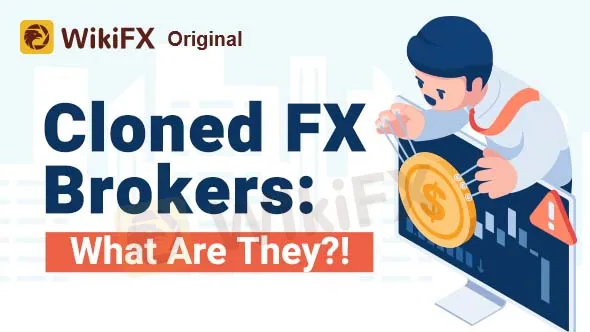简体中文
繁體中文
English
Pусский
日本語
ภาษาไทย
Tiếng Việt
Bahasa Indonesia
Español
हिन्दी
Filippiiniläinen
Français
Deutsch
Português
Türkçe
한국어
العربية
Cloned FX Brokers: What Are They?!
Abstract:The rise of the internet has revolutionized the way people invest and trade in the Forex market. However, with the increase in online trading, there has also been an increase in cloned Forex brokers.

The rise of the internet has revolutionized the way people invest and trade in the Forex market. However, with the increase in online trading, there has also been an increase in cloned Forex brokers. These cloned Forex brokers can be a significant risk for traders who may unwittingly sign up for a scam website, deposit funds, and potentially lose their money. In todays article, WikiFX will guide our readers to explore why people fall for cloned Forex brokers, why these clones are created, and the risks associated with them. Additionally, we will discuss how traders can avoid falling for these scams.
One of the primary reasons why people fall for cloned Forex brokers is (blind) trust. Many traders trust the Forex brokers they work with and may not be aware that cloned websites exist. Scammers create cloned Forex broker websites that look almost identical to legitimate websites, and it can be hard to tell the subtle differences. Additionally, these scammers may offer better deals or lower fees to entice people to sign up and deposit funds, which can be enticing for traders who are looking to save money or get a better deal.
Another reason why people may fall for cloned Forex brokers is a lack of knowledge. Some people may not be familiar with Forex brokers and may not know how to tell the difference between a legitimate website and a clone website. This lack of knowledge can make them vulnerable to scammers who take advantage of their ignorance.
Just recently, Spains financial watchdog, the National Securities Market Commission (CNMV) flagged pepperstoneld.com and primusfx.net which it believes are clones of Pepperstone and FXPrimus, which are two well-established brokerages within the industry.
Clone websites are created to scam people out of their money. The risks associated with these websites can be severe. Scammers may use clone websites to steal personal and financial information from people who sign up and make deposits. This information can be used for identity theft and fraud, leading to legal issues for the people who unwittingly signed up for the clone website. Additionally, people who sign up for clone websites may deposit funds, but those funds may never be returned. Scammers may take the money and run, leaving people without their money.
To avoid falling for cloned Forex brokers, traders should do their research in a thorough manner. They should make sure the Forex broker they are considering is legitimate by checking online reviews and ensuring that the broker is regulated by a reputable organization. Additionally, traders can contact the broker directly and ask them about the website if they are unsure if it is a legitimate clone or a scam. It is also essential to use secure payment methods such as credit cards or PayPal to protect their financial information. It is important for traders to always stay cautious and not let themselves be pressured into signing up or depositing funds if a deal seems too good to be true.
Last but not least, let us not forget the almighty and free WikiFX that is available for download on both Google Play and App Store! WikiFX is a platform that can efficiently help users avoid falling for cloned Forex brokers. It achieves this by offering a comprehensive database of Forex brokers and their regulation status, a blacklist of fraudulent Forex brokers, a warning system that alerts traders to potential fraud, educational resources on how to identify and avoid cloned Forex brokers, and personalized customer support. These resources empower traders to make informed decisions and protect themselves from the risks associated with cloned Forex brokers.

Disclaimer:
The views in this article only represent the author's personal views, and do not constitute investment advice on this platform. This platform does not guarantee the accuracy, completeness and timeliness of the information in the article, and will not be liable for any loss caused by the use of or reliance on the information in the article.
Read more

Georgia Man Charged in Danbury Kidnapping and Crypto Extortion Plot
Georgia man James Schwab charged in Danbury kidnapping tied to $230M crypto heist. Plot targeted couple for ransom after Miami altercation with son.

March Oil Production Declines: How Is the Market Reacting?
Oil production cuts in March are reshaping the market. Traders are closely watching OPEC+ decisions and supply disruptions, which could impact prices and future production strategies.

How to Calculate Leverage and Margin in the Forex Market
Leverage amplifies both potential profits and risks. Understanding how to calculate leverage and margin helps traders manage risks and avoid forced liquidation.

Galaxy Digital Settles $200M in Luna Token Manipulation Case
Galaxy Digital pays $200M to settle Luna token manipulation probe by NY regulators, linked to TerraUSD’s 2022 crash, impacting crypto market stability.
WikiFX Broker
Latest News
Exposing the Top 5 Scam Brokers of March 2025: A Closer Look by WikiFX
Gold Prices Climb Again – Have Investors Seized the Opportunity?
Webull Launches SMSF Investment Platform with Zero Fees
Australian Regulator Warns of Money Laundering and Fraud Risks in Crypto ATMs
The Withdrawal Trap: How Scam Brokers Lure Victims into Paying More
FCA to Investors: Think Twice Before Trusting These Brokers
Trump\s tariffs: How could they affect the UK and your money
Trump gambles it all on global tariffs he\s wanted for decades
HTFX Spreads Joy During Eid Charity Event in Jakarta
How Will the Market React at a Crucial Turning Point?
Currency Calculator







